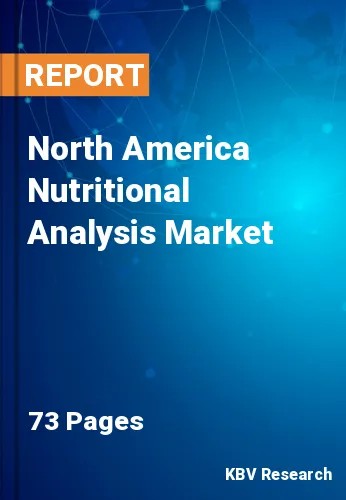The North America Nutritional Analysis Market would witness market growth of 7.3% CAGR during the forecast period (2023-2029).
Many nations have introduced statutory legislation governing the composition of significant food products due to the improvement of analytical techniques for determining the composition of foods and beverages and the concern over adulteration. Nutritional analysis has become a basic step in the food development cycle in the past few decades, especially after food production underwent a revolutionary change because of quick breakthroughs in food science and technology. Public knowledge of the connections and causes between health and diet has also been boosted by media coverage.
As a result, informed customers today are more concerned about the nutritional value and composition of the food they buy, its components, and the existence of additives and pollutants. Therefore, it is crucial for consumer health, well-being, and safety to understand food's chemical and biological makeup. For the purpose of assuring quality, determining nutritional value, and adhering to legal requirements, analytical characterization is also crucial. The issue of providing information on the various components of these complex food items has led to the development of a variety of current food analytical techniques, including chromatography, spectroscopy, electrophoresis, rheological procedures, and sensory evaluation.
The U.S. Food and Drug Administration (FDA) also demands changes to the Nutrition Facts label based on recent nutrition research, up-to-date scientific knowledge, and public feedback. The FDA is prioritizing nutrition programs to guarantee that Americans have easier access to nutrition information and healthier foods that enable informed decision-making. Improved eating habits could arise from more access to better foods, benefiting everyone's health and well-being. In this regard, the White House unveiled a National Strategy to end hunger and promote physical activity and healthy eating by 2030 at its Conference on Hunger, Nutrition, and Health on September 28, 2022, to reduce the prevalence of diet-related disorders like diabetes, obesity, and hypertension among consumers. Therefore, the region presents robust expansion potential for the market throughout the coming years.
The US market dominated the North America Nutritional Analysis Market by Country in 2022, and would continue to be a dominant market till 2029; thereby, achieving a market value of $2,345.9 Million by 2029. The Canada market is poised to grow at a CAGR of 9.4% during (2023 - 2029). Additionally, The Mexico market would display a CAGR of 9.1% during (2023 - 2029).
Based on Analysis Type, the market is segmented into Laboratory Testing and Nutritional Database Testing. Based on Nutrients, the market is segmented into Macronutrients and Micronutrients. Based on Product Type, the market is segmented into Bakery & Confectionery, Dairy, Snacks, Meat Products, and Others. Based on countries, the market is segmented into U.S., Mexico, Canada, and Rest of North America.
Free Valuable Insights: The Worldwide Nutritional Analysis Market is Projected to reach USD 9.2 Billion by 2029, at a CAGR of 7.9%
The market research report covers the analysis of key stake holders of the market. Key companies profiled in the report include SGS S.A., TÜV Nord Group, Eurofins Scientific SE, Intertek Group PLC, Microbac Laboratories, Inc., Compu-Food Analysis, Inc., Pat-Chem Laboratories LLC, ALS Limited, Lifeasible, Inc., and Opal Research And Analytical Services.
By Analysis Type
By Nutrients
By Product Type
By Country
Our team of dedicated experts can provide you with attractive expansion opportunities for your business.

